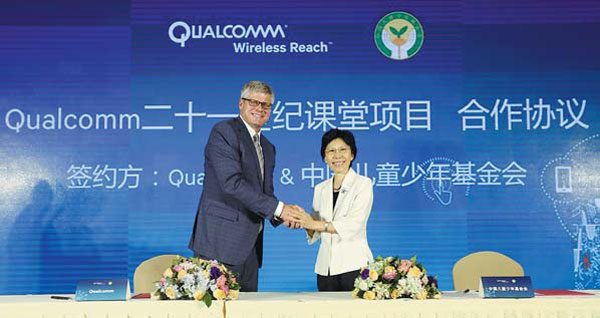Qualcomm partners with China for shared success
|
Coinciding with the seventh US China Business Leaders and Former Senior Officials Dialogue in Beijing on Sept 17-18, Qualcomm, through its Wireless Reach initiative, and China Children and Teenagers Fund announced their collaboration on the Qualcomm 21st Century Classroom program, a mobile broadband-based learning program that supports the Chinese government's use of information and communications technologies to modernize education and reduce poverty. Qualcomm CEO Steve Mollenkopf shakes hands with Zhao Donghua, deputy director general of the fund. Provided to China Daily |
Chinese President Xi Jinping's visit to the United States coincides with the 70th anniversary of the United Nations, an organization that embodies global partnerships.
Governments, economies and industries around the world are increasingly aware that partnerships lead to shared successes.
As a global technology company, Qualcomm is dedicated to combining our expertise and technological strengths with those of our partners to satisfy growing demand for mobile broadband solutions.
For two decades, Qualcomm has collaborated with a range of Chinese companies to create new ways to connect people and communities.
As a result, the Chinese mobile ecosystem has experienced tremendous growth, and consumers have realized incredible benefits in their work and personal lives.
According to a 2015 study by the Boston Consulting Group, consumer adoption of 3G and 4G technologies has outpaced all other technologies, growing to 3 billion connections in less than 15 years.
The study projected that the number of connections will grow to more than 8 billion by 2020. These connections have unlocked enormous economic opportunities in China and the US.

Qualcomm is collaborating across the mobile communications industry to help build an innovative and technology-driven Chinese economy.
We have made huge investments to make our cutting-edge technologies meaningfully available to Chinese handset manufacturers, which have helped those Chinese companies establish themselves as top global manufacturers in the mobile industry.
Qualcomm also works with Chinese mobile operators to provide fundamental technology education, training and support to facilitate China's transition from 3G to 4G.
Five of the top 10 global 3G/4G handset manufacturers were Chinese in 2014, compared to only one in 2008.
Five out of the top 10 global 3G/4G smartphone manufacturers were Chinese in 2014, as opposed to only two in 2011, according to IDC in February 2015.
Achieving milestones
Through defining a shared vision based on investing in industry-leading technology, local relationships and regional talent, we believe the potential exists to reshape the Chinese semiconductor and data center landscape.
Qualcomm has helped accelerate the development of China's semiconductor industry through our partnership with Semiconductor Manufacturing International Corp to expand its product portfolio and locations and form SMIC Advanced Technology Research and Development (Shanghai) Corp.
Announced in June, the SMIC partnership is a significant milestone for the Chinese and global IC industries.
SMIC recently announced that its 28nm process technology, which is being used for manufacturing Qualcomm Snapdragon 410 processors, and has been successfully adopted into mainstream smartphones. This marks a significant step in the commercial usage of 28nm core chips, and a new era of advanced mobile phone chip manufacturing in China.
This is another major breakthrough in the companies' collaboration on 28nm and reinforces Qualcomm's commitment to the entire semiconductor ecosystem in China.
In addition to our work with SMIC, Qualcomm has entered into a memorandum of understanding with Guizhou province to explore the establishment of an independent Chinese legal entity to develop and sell chipsets based on Qualcomm's ARM-based server technology for use within China.
Promoting development
Qualcomm believes access to advanced wireless technology can improve people's lives.
Qualcomm Wireless Reach is an initiative that brings wireless technology to underserved communities globally.
Wireless Reach has worked with stakeholders since 2006 to launch programs that leverage mobile broadband to achieve economic and social impact in critical areas such as healthcare and education.
To date, Wireless Reach programs have directly or indirectly benefited nearly 850,000 people in China.
Wireless Reach and the organizations we collaborate with have invested an estimated 60 million yuan ($9.23 million) in these programs.
Most recently, coinciding with the APEC CEO Summit in Beijing, Qualcomm announced the creation of the China Center for mHealth Innovation, known as CCmHI, to support the Chinese central government's goal of improving community healthcare in China, as stated in the 12th Five-Year Plan (2011-2015).
Hosted by the George Institute for Global Health at Peking University Health Science Center and funded by Qualcomm Wireless Reach, CCmHI is set to become a world-class center for mobile health (mHealth) innovation.
Working with central and provincial governments, CCmHI will help improve community healthcare by developing mHealth solutions, implementing clinical evaluations and contributing to strategies for the implementation and scale-up of effective and affordable mHealth tools.
Wireless Reach, along with Sesame Workshop, China Telecom, Sichuan Normal University, Southwest University and other local partners announced the results of a new mobile road safety program in China that uses educational e-books optimized for mobile access to help families with preschool-age children learn how to travel safely by car, bike, bus, train and foot.
Results indicate that participating children made measurable gains in road safety knowledge - an increase of 36 percent in scores from pre-test to post-test.
The mobile tools are now available, free of charge, for families across China.
The Mobile Road Safety First! program supports the government's National Plan of Action for Children (2011-2020), which highlights the need for enhancing road safety education in schools and the need for increasing road safety awareness and behavior among parents and children.
Local innovation
Chinese startups at the forefront of innovative technologies for smartphone users are also poised for growth, and the Qualcomm Ventures program aims to coach and collaborate with these next-generation leaders to create new opportunities.
As global technology standards are developed through cross-nation collaboration and cooperation, the stage is set for Chinese companies to expand overseas and reduce barriers to further innovation.
An active participant in the China Communications Standards Association and the global third Generation Partnership Project, Qualcomm has helped support Chinese operators and companies with localization of various technologies. The China Academy of Information and Communications Technology and China Telecom also have received active support from Qualcomm during the past ten years to research, develop and deploy world-class networks in China and overseas.
Mutual benefits
Last year, Qualcomm announced a commitment to invest up to $150 million in Chinese startup companies that further the development of mobile technologies in the following areas: Internet, e-commerce, semiconductors, education and health.
Through these investments and ongoing partnerships with Chinese companies, Qualcomm is committed to helping empower innovation in China. Currently, more than 80 customers in China are working with Qualcomm on more than 400 projects that are expected to yield more than 800 product launches to help people work and connect in new ways.
These partnerships provide a cycle of support for Chinese companies who depend on innovation to compete.
By contributing technologies to key standardization bodies, Qualcomm has helped to level the playing field for emerging companies from China, as well as established players looking to expand.
These standards help to encourage innovation and competition in China and across the wireless industry.
Common dreams
China's Internet Plus national strategy will encourage economic growth by integrating the Internet with traditional industries.
Qualcomm's leadership in the development of the Internet of Things is expanding through partnerships with companies in the automotive, robotics, healthcare, smart home, wearables and smart cities markets. These achievements help support China's Internet Plus plan and overall commitment to innovation.
Innovation is the foundation of Qualcomm's success. We look forward to using our innovations and expertise to support China's "entrepreneurship and innovation".
Working toward common goals, we can achieve our shared dream of a fully connected global community, while increasing economic opportunity on both sides of the Pacific.
Qualcomm looks forward to continued partnership, innovation and shared success under President Xi Jinping's leadership.
(China Daily 09/24/2015 page23)















